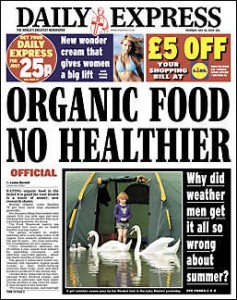Interview with FoodSafetyNews.com
I did a Q and A with Helena Bottemiller of the new food safety website, FoodSafetyNews.com about the politics of food safety. It’s online at the site. Here’s the text of the interview (absent the blurb and photograph):
Q: There has been a lot of rhetoric coming from Administration-appointed officials on food policy this year–on encouraging fruits and veggies, on promoting local food, on strengthening food safety. Do you think these ideas will make a big impact on the current food system, or are the institutional and political barriers to change too great?
A: It’s not one or the other; it’s both. Yes, federal support will encourage small farmers and organic production and these sectors will grow as a result, and that’s a good thing. But they still account for, and will continue to account for, only a tiny fraction of food production. I expect growth in alternative agriculture with big percentage jumps, but the base will be small for a long time. I think the question is whether the growth in alternative systems will place pressure on industrial agriculture to improve its practices. I hope so.
Q: You’ve written before about the “revolving door” at the U.S. Food and Drug Administration and the U.S. Department of Agriculture–where regulators have close ties to the sector that they regulate from moving between roles in government and industry. I know you’ve been supportive of Michael Taylor, a top advisor to FDA Commissioner Hamburg, despite his former ties to industry, because of his policy positions. Are we seeing a better revolving door?A: Of course it persists and always will, and is a huge problem for governmental integrity. The Michael Taylor situation is not so simple. In some circles, his appointment is a deal-breaker; anti-GMO groups will never forgive him for his role in FDA approval and non-labeling of GM foods. Whether FDA will revisit the labeling issue, I have no idea–I wish it would–but Taylor has a long and consistently solid record in the food safety area. He performed food safety miracles at USDA in the mid-1990s and that makes him a good choice for food safety initiatives that I hope are coming at FDA. I think he needs to be given a chance.Q: Do you think the Senate will address food safety this fall, and are you supportive of the bills? What do you think about the push back from small and sustainable agriculture folks?A: I hope the Senate acts, and soon. If it doesn’t, FDA’s hands are tied and we can expect massive outbreaks of foodborne illness to continue unabated. Even so, Congress is not doing what everyone agrees needs to be done: create a single food safety agency with responsibility, authority, and resources to require safe food production from farm to table. Food safety is just like health care. Everyone knows what is needed but Congress is too corrupt to act.As for small farmers: I think everyone producing food–no exceptions–should be using science-based food safety procedures with testing. Congress needs to make it possible for small-scale producers to do this. While getting local testing facilities in place, Congress also ought to provide for local slaughter. Both would make a big difference.Q: In your opinion, what are the top five ways we could create a safer food supply?A: 1. Require HACCP (science-based food safety regulations) with test-and-hold pathogens for all producers from farm to table.2. Create a single food safety agency to monitor and enforce regulations, with adequate resources to do so.3. Ban the use of antibiotics in animal agriculture for non-therapeutic purposes.4. Do a major national education campaign for hand washing (and require restaurants to provide hot water, soap and towels for that purpose).5. Reform election campaign laws so elected representatives can focus on public health rather than corporate health.


